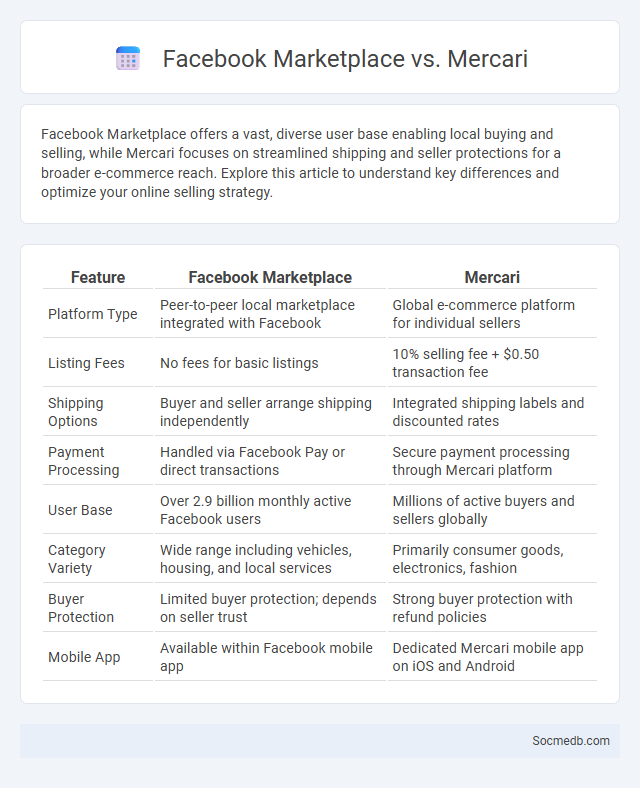
Photo illustration: Facebook Marketplace vs Mercari
Facebook Marketplace offers a vast, diverse user base enabling local buying and selling, while Mercari focuses on streamlined shipping and seller protections for a broader e-commerce reach. Explore this article to understand key differences and optimize your online selling strategy.
Table of Comparison
| Feature | Facebook Marketplace | Mercari |
|---|---|---|
| Platform Type | Peer-to-peer local marketplace integrated with Facebook | Global e-commerce platform for individual sellers |
| Listing Fees | No fees for basic listings | 10% selling fee + $0.50 transaction fee |
| Shipping Options | Buyer and seller arrange shipping independently | Integrated shipping labels and discounted rates |
| Payment Processing | Handled via Facebook Pay or direct transactions | Secure payment processing through Mercari platform |
| User Base | Over 2.9 billion monthly active Facebook users | Millions of active buyers and sellers globally |
| Category Variety | Wide range including vehicles, housing, and local services | Primarily consumer goods, electronics, fashion |
| Buyer Protection | Limited buyer protection; depends on seller trust | Strong buyer protection with refund policies |
| Mobile App | Available within Facebook mobile app | Dedicated Mercari mobile app on iOS and Android |
Introduction to Online Marketplaces
Online marketplaces serve as digital platforms where buyers and sellers exchange products and services, leveraging the vast reach of social media networks to enhance visibility and engagement. These marketplaces integrate user-generated content, social interactions, and targeted advertising to create a dynamic shopping experience that drives higher conversion rates. By utilizing advanced algorithms and data analytics, online marketplaces optimize product recommendations and streamline transactions, offering personalized shopping journeys for diverse consumer segments.
Overview of Facebook Marketplace
Facebook Marketplace is a dynamic online platform allowing users to buy, sell, and trade goods within their local communities, facilitating transactions through Facebook's extensive social network. The Marketplace integrates seamless browsing with powerful search filters, promoting millions of listings across categories like electronics, furniture, and vehicles. With built-in messaging and secure payment options, Facebook Marketplace streamlines peer-to-peer commerce while leveraging user profiles and reviews to enhance trust and transparency.
Understanding Mercari Platform
Mercari is a leading peer-to-peer marketplace app that enables users to buy and sell a wide variety of new and used items with ease. The platform leverages social media integration to enhance user engagement through features like in-app messaging, ratings, and social sharing options. Mercari's intuitive interface and robust search algorithms optimize product discovery, making it a popular choice among social commerce communities.
Key Features Comparison
Social media platforms differ significantly in user engagement, content types, and privacy settings, with Facebook emphasizing community building and detailed event organization, Instagram focusing on visual storytelling through photos and short videos, and Twitter prioritizing real-time updates and concise messaging with character limits. TikTok excels in algorithm-driven, short-form video content fostering viral trends, while LinkedIn targets professional networking and career development through industry-specific content and job listings. Understanding these distinctions enables users and marketers to select platforms that align with their communication goals and audience demographics.
User Interface and Experience
A seamless User Interface (UI) in social media platforms enhances Your engagement by providing intuitive navigation and visually appealing layouts that reduce cognitive load. Prioritizing User Experience (UX) ensures fast load times, personalized content delivery, and accessible features, boosting user satisfaction and retention. Optimizing these elements directly impacts how effectively users interact, share, and consume content.
Listing and Selling Process
Creating a detailed listing with high-quality images and accurate descriptions enhances visibility and attracts potential buyers on social media platforms. Your selling process improves when you engage with interested customers promptly and provide clear information about pricing, shipping, and returns. Optimizing posts with relevant hashtags and keywords increases reach and boosts sales performance effectively.
Buyer Protections and Policies
Social media platforms implement robust buyer protections and policies to ensure secure transactions and build consumer trust. These policies often include dispute resolution mechanisms, refund guarantees, and strict seller verification processes designed to prevent fraud and unauthorized sales. Monitoring and enforcement through automated systems and user reporting play a crucial role in maintaining a safe marketplace environment on platforms like Facebook Marketplace, Instagram Shopping, and TikTok Shop.
Fees and Payment Structures
Social media platforms use diverse fees and payment structures, including subscription fees, advertising costs, and in-app purchase charges to monetize their services. You should carefully evaluate each platform's fees, such as Pay-Per-Click (PPC) advertising rates, influencer partnership fees, and premium content subscriptions, to optimize your marketing budget. Choosing the right payment model helps maximize ROI and ensures financial efficiency in managing your social media presence.
Audience Reach and Demographics
Maximizing audience reach on social media requires understanding and targeting specific demographics such as age, location, interests, and behavior patterns. Tailoring content to resonate with your key demographic segments increases engagement and brand visibility across platforms like Facebook, Instagram, and TikTok. By analyzing social media insights and data analytics, you can optimize your strategy to connect effectively with Your ideal audience.
Pros and Cons: Facebook Marketplace vs Mercari vs Marketplace
Facebook Marketplace offers extensive user reach and diverse product listings, making it ideal for local sales and casual sellers. Mercari provides a streamlined platform with integrated shipping options, appealing to users seeking convenience and buyer protection. However, Facebook Marketplace may lack seller safeguards, and Mercari's fees can be higher, while traditional marketplaces often require more effort for listing and communication but sometimes offer lower transaction costs.
 socmedb.com
socmedb.com